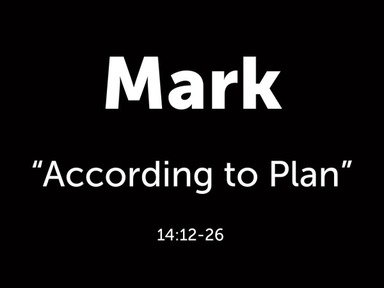Mark (28)

Sermon • Submitted • Presented • 33:45
0 ratings
· 15 viewsFiles
Notes
Transcript
Preparation
Preparation
Offer background
The passover meal was celebrated each year in order to remember the Deliverance God had provided for the nation of Israel from Egypt with the leadership of Moses.
Throughout the meal the host would have used four cups of wine as a symbol to retell four key promises God made in Exodus 6:6-7. (Rescue, Deliverance, Redemption, Renewal of relationship.)
Say therefore to the people of Israel, ‘I am the Lord, and I will bring you out from under the burdens of the Egyptians, and I will deliver you from slavery to them, and I will redeem you with an outstretched arm and with great acts of judgment. I will take you to be my people, and I will be your God, and you shall know that I am the Lord your God, who has brought you out from under the burdens of the Egyptians.
The meal would have included some specific food to remind them of God’s deliverance. * See picture (
unleavened bread: to remind them of the purity of the Lamb without stain or blemish that was slain and blood was applied to their doorposts on the day of their deliverance.
bitter herbs: To remind them of the bitterness they endured in slavery to the Egyptians.
stewed fruit: Made to look like the brownish red mortar of the bricks that they made under Pharaoh's harsh control was to remind them and the sweetness of the dish reminded them of the sweetness of God’s redemption.
roasted lamb: The essential center of the meal as a reminder of the Lamb that was sacrificed for their freedom and the fire to roast the Lamb as a reminder of the judgment God brought upon Egypt.
The very meal they were participating in was to be a testimony revealing Jesus as the messiah, the Lamb of God who was taking away the sin of the world. All this was, According to plan…
Transition: How can we be so sure?
Prophecy
Prophecy
1. “The Son of Man”… (Dan. 7:13-14)
a. The usage of this title by Jesus is a connection to prophecy written concerning a coming Messiah. Jesus is using the phrase on purpose! Also, we will see the title used 13 more times throughout Mark. All of which help to reveal Jesus ministry, suffering, death, Resurrection, and future glory.
b. (if time permits) For example: In connection to His ministry as seen here and in 2:28) We also see it used in connection with His suffering, death, and resurrection (8:31; 9:9, 12, 31; 10:33–34, 45; 14:21; 41); and Finally we see the title used in connection to His glorious return (8:38; 13:26; 14:62)
2. “as it is written”… (Psalm 41:9)
Even my close friend in whom I trusted,
who ate my bread, has lifted his heel against me.
3. “It would have been better”… (Psalm 109)
a. Reveals the compassion of Jesus for His betrayer.
b. Reveals the consequence of sin for Judas who made a personal responsible for act of rebellion against God. God is responsible for having Jesus “go” according to plan, and Judas is true to his nature in taking action against God.
Transition: Before we get too caught up in focusing attention on Judas, we should be asking the question…
3.. “Is it I?”… Betrayer or Believer?
Passover
Passover
Jesus fulfils all the symbolism of the passover meal.
He is experiencing the bitterness of betrayal, and the cruel punishment of dying innocently in the place of sinners as the spotless lamb of God. His blood is the cup of redemption poured out for sinners. His resurrection and future coming is the sweetness of God’s promised renewal for those who belong to him.
As I Cor 5:7 says…
Cleanse out the old leaven that you may be a new lump, as you really are unleavened. For Christ, our Passover lamb, has been sacrificed.
2. This is why Jesus instituted the command for His followers to regular participate in the “Lord’s table”. It is a reminder for us that Jesus along is the Lamb of God, the suffering Messiah, the very center of our worship.
3. As verse 25 reminds us, Jesus refrained from drinking the fourth cup because he will do that when He renews the final completion of His kingdom.
4. Because of this, when we participate in this meal of juice and bread, we are proclaiming the Lord’s death until He comes. We are remembering the price He paid for us to be in right relationship to God. We are celebrating the sufficient sacrifice of His pure blood on the cross. That because of His death we can live. All according to plan!
5. So today, we are going to conclude our time together by celebrating communion. (Offer instructions)
germ free elements available. (show how to open)
Respecting one another’s distance come and take your cup back to your seat.